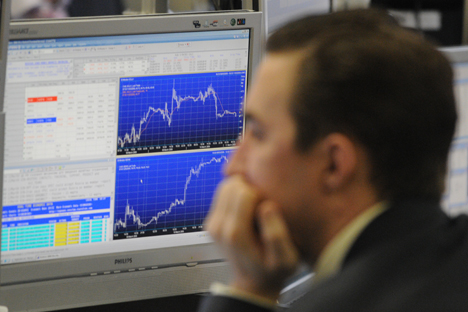
Since the beginning of the year the total inflow of foreign investment in Russian stock has exceeded $727 million.
Itar-TassSince the beginning of November international investors have been increasing their investments in the Russian stock market. According to Citibank (which has based its calculation on the Emerging Portfolio Fund Research, EPFR), the total amount of foreign investment in Russian stock in the week ending Dec. 22 was $120 million.
Since the beginning of the year the total inflow of foreign investment in Russian stock has exceeded $727 million. This is the first positive annual result since 2012 (in that year foreign investors invested $410 million) and the maximum result since 2010 ($3.3 billion). Significantly, according to estimates by Russian business daily Kommersant, which are also based on EPFR data, in 2016 foreign investors invested about $1 billion in emerging stock markets (including Russia's).
Foreign portfolio investors' steadfast interest in the Russian market raised Russian stock indexes at the end of the year to a historic maximum. At the beginning of the year the stock market index was at 23.7 percent.
According to Bloomberg, in dollar value the index increased by 47 percent, demonstrating one of the best results among stock indexes in developed and developing countries. Only the Brazilian, Kazakh and Peruvian stock indexes grew more – by 59-63 percent.
OPEC's historical decision in November to limit oil production and the unexpected result of the U.S. presidential elections had a positive effect on Russian stocks. According to EPFR, in the six weeks after Republican candidate Donald Trump's victory, foreigners invested almost $1.3 billion, thus compensating the outflow of investment in the previous two and a half years.
"The sanctions and the low oil prices put pressure on the Russian market in 2014-2015,” said Farit Zakirov, portfolio manager at the Trinfico Group.
“But with the possible reconciliation between Russia and the U.S. after Donald Trump's victory and the strengthening of oil prices at $50 per barrel the competitive gap between the Russian market and that of other emerging countries, which was formed in the last years, has quickly been reduced."
Market participants estimate that the inflow of foreign investment in Russia will continue into the beginning of 2017. At least this is what is expected before Donald Trump's inauguration, after which investor behavior will depend on whether or not real convergence between Russia and the U.S. actually takes place.
According to Christian Gattiker, director of the analysis department at Julius Baer Bank, American sanctions will end in March 2017 and this creates room for reducing disagreement between the sides.
"There are many Western funds that because of the sanctions cannot buy Russian company stock, but want to very much," explained Gattiker.
First published in Russian by Kommersant
All rights reserved by Rossiyskaya Gazeta.
Subscribe
to our newsletter!
Get the week's best stories straight to your inbox